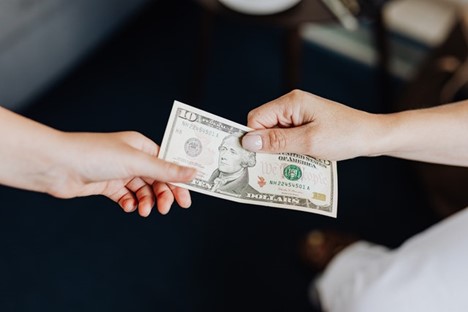
The old adage that money doesn’t buy happiness is generally true. Beyond the level of income required to live comfortably, making extra money doesn’t increase people’s happiness.1
And spending money on stuff, like a new car or a bigger TV, won’t make you any happier in the long run. You’ll get a short burst of pleasure from the purchase, but you’ll quickly get used to having the upgraded version of whatever you bought, and you might even start feeling like you need an even better version – a process known as hedonic adaptation.2
So we should certainly step off of the hedonic treadmill and think more carefully about how we spend our money. But money can buy happiness if you know how to spend it correctly. Here are five ways to spend money that research shows will make you happier.
1. Spend money on other people.
That’s right, spending money on other people rather than on yourself has been shown time and again by researchers to make us happier.3 This can range from buying a gift for a loved one to paying for a stranger’s coffee to giving money to charity. This is a specific case of the more general principle that being kind and generous makes us happier.

This is my favorite feature of human nature. So often, when people talk about evolutionary biology, they frame it as “survival of the fittest” – a fierce, bloody competition. But cooperation is one of the most common strategies organisms use to survive. And humans, being a tribal species, certainly have cooperation baked into our DNA.
The fact that spending money on other people makes us happier than buying stuff for ourselves doesn’t mean that I never buy anything for myself. But I have adopted a rule that says, “When I buy myself something I don’t really need, I will make a matching donation to charity.” (Click here to learn more about that rule.)
Now don’t worry – the rest of these tips aren’t so selfless. You can actually spend money on yourself to be happier.
2. Spend money on experiences.
One way to do that is by spending money on experiences. Paying to do things we enjoy tends to make us happier than buying stuff for ourselves.4

This is partly because we don’t get used to experiences in the same way that we become accustomed to the stuff we own. Even if the experience is going back to your favorite restaurant, something is always a little different.
And it’s also because we get to enjoy the experiences we buy several times, especially if we plan them in advance. For example, if you book an Airbnb for a weekend next month with some friends, you’ll get to look forward to that weekend in the weeks leading up to it, and having something to look forward to makes you happier. Then, when the weekend comes, you get to enjoy the actual experience. Finally, you get to enjoy the memories of that weekend repeatedly in the future.5 (Note: This is a good reason to take some photos of your experiences and look at them from time to time.)
And these don’t need to be big experiences, like a tropical vacation; they can be little things, like going to an improv show.
And since a healthy social life is one of the best predictors of happiness,6 spending money on social experiences is likely to give you more joy than spending money on solo endeavors.

3. Pay to reduce persistent annoyances.
You know that thing in your house that’s kind of broken? The thing you just keep putting up with? Yeah, fixing it or replacing it might cost money, but it would probably make you happier.
Why?
Because we tend to take the things that work well for granted and focus on the things that aren’t working well. (This negativity bias is one of the features of human nature I don’t particularly like.) The fact that we have this negativity bias means that fixing the things in our environment that are broken, annoying, or inefficient will make us happier … or at least, less unhappy.
For example, two of our foaming hand-soap dispensers were sticking – you could push the pump down to get soap out, but then the pump wouldn’t come back up. So every time I wash my hands, it was kind of a hassle to force the pump back up so I could actually get some soap out of it. I put up with this for months. I was unable to fix them, so I finally gave in and bought new ones. Cost? $12. Not exactly breaking the bank.

There’s a fine line between being frugal and being stingy. Assuming you can afford to fix or replace the problem thing, it’s probably worth doing.
4. Buy time.
Now you might be thinking, “Why not just fix it yourself?”
Good point. That’s often the best choice. Fixing things is usually cheaper than replacing them or hiring someone else to do it, and it can be really satisfying to pull out your tool kit and make things better with your own two hands.
But if you’re short on time or lacking in the required expertise and equipment, it might not be worth the effort to do it yourself. For example, if you earn $40 per hour at your job, and it would take you two hours and a trip to Home Depot to fix something, but only $50 to pay someone else to do it, it might make more sense to just hire an expert.
Indeed, time affluence has been shown to make people happier – and it’s something that few people feel they have. Most working Americans feel “time poor,” which can produce a set of emotions similar to financial poverty.7

So spending money to buy yourself spare time can be a wise investment, but it only works if you spend the time well. Perhaps you decide it’s worthwhile to hire someone to clean your house. If you use the spare time to work on a project you really care about or to spend quality time with your family, then that was a good choice. But if you squander that spare time binging Netflix, it probably wasn’t.
5. Spend money on self-development.
Lastly, you can increase your happiness by spending money on personal growth and self-improvement. This works because you derive great satisfaction from seeing yourself make progress toward goals that are meaningful to you.8 In a sense, this is like spending money on other people, only those other people are your future selves.
You could hire a therapist, a nutrition coach, a personal trainer, or a habit coach. You could take piano lessons, get Spanish tutoring, or take a coding class.
When there’s something you want to do or a skill you’d like to improve, and you’re not making progress, you’re likely to feel stagnant. So don’t be afraid to spend money to get help. Moving forward feels good.

1 Kahneman, Daniel, and Angus Deaton. “High income improves evaluation of life but not emotional well-being.” PNAS. September 21, 2010 107 (38) 16489-16493; https://doi.org/10.1073/pnas.1011492107.
2 Sheldon, Kennon M., and Sonja Lyubomirsky. “The Challenge of Staying Happier: Testing the Hedonic Adaptation Prevention Model.” Personality and Social Psychology Bulletin, vol. 38, no. 5, May 2012, pp. 670–680, doi:10.1177/0146167212436400.
3 Dunn, Elizabeth W., et al. “Spending Money on Others Promotes Happiness.” Science. March 21, 2008. Vol 319, Issue 5870pp. 1687-1688. DOI: 10.1126/science.1150952.
4 Van Boven L, Gilovich T. “To do or to have? That is the question.” J Pers Soc Psychol. 2003 Dec;85(6):1193-202. doi: 10.1037/0022-3514.85.6.1193. PMID: 14674824.
5 Newman, Kira M. “Six Ways to Get More Happiness for Your Money.” Greater Good Magazine. October 4, 2016.
6 Oppong, Thomas. “Good Social Relationships Are the Most Consistent Predictor of a Happy Life.” The Center for Compassion and Altruism Research and Education at Stanford.
7 Cho, Isabella B. and David R. Shaw. “Harvard Business School Professor Discusses ‘Time Affluence’ and Happiness in Book Talk.” The Harvard Crimson. October 7, 2020.
8 Wiese, B.S. (2007). “Successful pursuit of personal goals and subjective well-being.” In B.R. Little, K. Salmela-Aro, & S.D. Phillips (Eds.), Personal Project Pursuit: Goals, Action and Human Flourishing (pp. 301-328). Hillsdale, NJ: Lawrence Erlbaum.
